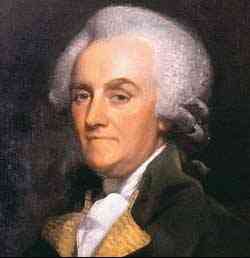William Franklin |
|
|---|---|
| Born | 1731 in Philadelphia, Pennsylvania |
| Died | 11/17/1813 in England |
| Ancestry | Father: Benjamin Franklin (1706 - 1790) Mother: Unknown "Low Woman" Spouse: Mary Johnson d'Evelin on 8/14/1788 Children: None |
Biography |
|
Early life
Military serviceWilliam joined the American Regiment and fought in Albany in the King George's War, eventually obtaining the rank of captain. He completed his education in England, and was admitted to the bar. William and Benjamin Franklin were partners and confidantes, working together to pursue land grants in the Midwest. William was engaged to Elizabeth Graeme, daughter of prominent Philadelphia physician Dr. Thomas Graeme and granddaughter of Pennsylvania's 14th Governor, Sir William Keith. Neither family approved of the match, and when William went to London to study law, he left with the understanding that Elizabeth would wait for him. While there, however, he married another Elizabeth - Elizabeth Downes {1728-1777}- on September 4, 1762 and had one son, William Temple Franklin, who may or may not have been illegitimate, and who, by mutual decision, was raised by Benjamin Franklin. Governor of New JerseyWhen the family returned from England, in 1763, he carried a commission from George III to be the Royal Governor of New Jersey, secured in large part based on his father's lobbying efforts. As Governor, William Franklin signed the charter for Queen's College, which would evolve into Rutgers University. Owing to his father's pivotal role as a Founding Father of the American Revolution and William's loyalty to Britain, the relationship between father and son was strained past the breaking point. When Benjamin finally decided to take up the patriot's cause, he tried to convince William to join him, but the son stayed steadfastly loyal to the Crown. William remained as governor until he was arrested in 1776 by the Provincial Congress of New Jersey, an entity which William refused to recognise, regarding it as an "illegal assembly". For two years, he was held as a prisoner, first in Wallingford then Middletown where he surreptiously engaged Americans in supporting the Loyalist cause. Discovered, he was incarcerated in Litchfield, Connecticut under appalling conditions for eight months. When finally released in 1778, he moved to New York City, which was still occupied by the British. He was active in the Loyalist community of New York, becoming prominent on the Board of Associated Loyalists. He sought a guerilla war and active reprisals against the rebels but was frustrated by General Clinton. Franklin played a role in the hanging of Joshua Huddy. ExileIn 1782, Franklin left with other loyalists for England , never to return. William would see his father one last time in 1785, when Benjamin stopped in Britain following his return from a trip to France. On August 14, 1788 William married Mary Johnson d'Evelin. In his will, Benjamin Franklin left William virtually none of his wealth, except some territory in Nova Scotia, stating that had Britain won the war, the elder Franklin would have had no wealth to leave to his son anyway. Neither does Benjamin mention his son in his autobiography except indirectly by the inclusion of a newspaper article in which Benjamin notes that his (then still in good standing) son may make contracts for the procurement of carts for the British army. William tried without success to reconcile with his father through a letter sent on August 16 1784. William Franklin died in 1813, and is buried in St Pancras Old Church churchyard. Franklin Township, in Bergen County, New Jersey was named in his honor, rather than for his father, as was the borough of Franklin Lakes. Franklin Township, in Somerset County, New Jersey, site of the Revolutionary War Battle of Middlebush, was believed by many to have been named for him, though no document exists to prove so. In 2000, the Franklin Township Council determined it should espouse the hypothesis that the Township was indeed named for Benjamin Franklin. Downe Township, Cumberland County, New Jersey was named after the maiden name of Williams wife, Elizabeth. The "s" on Downes was dropped. |
|
 He was born in Philadelphia, the illegitimate son of Benjamin Franklin. His mother's identity is unknown though evidence suggests she was a "Low Woman". He was raised by his father and his common-law wife Deborah Read. There is some speculation William's mother may have been Deborah Read, and that because of his parents' common law relationship, the circumstances of his birth were obscured so as not to be politically harmful to William. He accompanied his father on several missions, including his trips to England. Although often depicted as a young child when he assisted his father in the famed kite experiment in 1752, William was 21 years old at the time.
He was born in Philadelphia, the illegitimate son of Benjamin Franklin. His mother's identity is unknown though evidence suggests she was a "Low Woman". He was raised by his father and his common-law wife Deborah Read. There is some speculation William's mother may have been Deborah Read, and that because of his parents' common law relationship, the circumstances of his birth were obscured so as not to be politically harmful to William. He accompanied his father on several missions, including his trips to England. Although often depicted as a young child when he assisted his father in the famed kite experiment in 1752, William was 21 years old at the time.